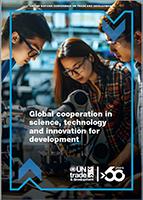
The growing complexity and rapid evolution of new technologies underscore the need for global collaboration in Science, Technology, and Innovation (STI) to address pressing global challenges and advance the Sustainable Development Goals.
The benefits of frontier technologies are not distributed equally among developed and developing countries, and the gap is even widening. Developed countries are seizing most of the opportunities of the technological revolution unleashed by Industry 4.0, Artificial Intelligence (AI) and green technologies, putting developing countries at risk of being left behind as happened in previous waves of technological innovation.
The international community has a crucial role to play in supporting developing countries to strengthen national capacities in STI and to facilitate their participation in global science and technology networks, which are currently dominated by a few strongly interconnected organizations.
These efforts would help strengthen the national innovation systems of developing countries and guarantee that the global research and innovation agenda meets their interests and needs.
This paper explores ways to improve STI cooperation at the global and regional levels to scale up the impact of existing experiences on key development challenges.
The paper is structured as follows.
- Section II provides a brief overview of the four key elements for STI development that serves as a framework for a more in-depth analysis of international STI collaboration.
Section III examines the status of global STI cooperation under each of the four elements for STI development, focusing on research and development (R&D) that is crucial for the use, adoption and adaptation of technologies and innovations.
It discusses collaboration mechanisms, lessons learned and good practices of different initiatives, as a background to formulate recommendations on how to strengthen global cooperation in STI for sustainable development.
- Section IV reviews the contribution of the CSTD in facilitating global STI cooperation and highlights its role in coordinating and imparting directionality to international STI collaboration.
- Section V concludes and provides recommendations for the consideration of Member States, the international community and the CSTD.


